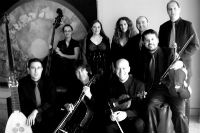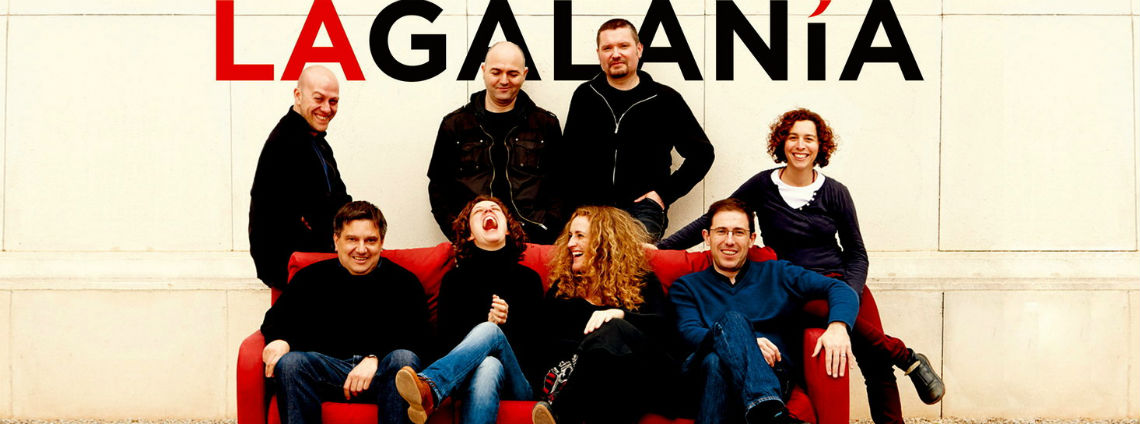Christ Church Cathedral | Map
Ensemble La Galanía; Raquel Andueza
Locura & Tormenti (madness and torments) features intimate 17th century Spanish and Italian songs about love and heartbreak by composers including Monteverdi, Quevedo, Strozzi and Sanz.
Spanish soprano Raquel Andueza is one of Spain’s most respected early music vocalists, and works regularly with L’Arpeggiata, Al Ayre Español, Gli Incogniti, Orquesta Barroca de Sevilla. She is also a regular guest of conductors including William Christie, Fabio Biondi, Monica Huggett, Eduardo López-Banzo, Christina Pluhar, Richard Egarr, Ottavio Dantone and Sir Colin Davis.
Supported by Stephen and Betty Drance and Jose Verstappen
Click here for information about parking around / transiting to Christ Church Cathedral
Programme
(download texts and translations)
I
Yo soy la locura – Henry du Bailly (¿? – 1637)
Marizápalos
– Anonymous (s. XVII)
Zarabanda del Catálogo – Text: Anónimo
/ Arrangement: Álvaro Torrente (n. 1963)
Folias – G. Sanz/improv (ca. 1640 – 1710)
Sé que me muero
– Jean Baptiste Lully (1632-1687)
La Ausençia
– Anonymous (s. XVII)
Vuestros ojos tienen d’amor – Anonymous (s. XVII)
Canarios
– Francisco Gerau (1649 – 1722)
Jácara de la Trena – Text: Francisco Quevedo (1580 – 1645) / Arrangement: Álvaro Torrente (1963)
II
Folle è ben che si crede – Tarquinio Merula (1595 – 1665)
Eraclito amoroso – Barbara Strozzi (1619 – 1664)
Bella mia
– Anonymous (siglo XVII)
Toccata arpeggiata – Giovanni G. Kapsberger (1580 – 1651)
Oblivion soave
– Claudio Monteverdi (1567 – 1643)
Caprice de Chacone – Francesco Corbetta (1615 – 1681)
Sdegno campione audace – Virgilio Mazzocchi (1597 – 1646)
Chi vuol ch’il cor gioisca – Pietro P. Capellini (fl. 1641 – 1660)
Programme Notes
“Locura & Tormenti”, madness and torments: they usually go together when concerning love. We wanted to bring together these two visceral feelings in a program, which consist of two very different sections.
In the first part, we will perform Spanish music, but also scores with text in Castilian that have been found in 17th century French, English, and Italian collections: songs about love and disaffection, hope and abandonment.
Likewise, we bring some new music to light, created upon the harmonic and rhetorical parameters of two very famous dances of the Spanish baroque: the Zarabande and the Jácara. The Zarabande was already forbidden in 1583 because it was considered an obscene and disgraceful dance, but composers and the greatest men of letters (Cervantes, Góngora, Lope de Vega, etc) continued making use of it and the Zarabanda was hugely popular until the end of the 17th century. All the written music was lost (or destroyed), but not its texts. The Spanish musicologist Álvaro Torrente, one of the greatest specialists of the Spanish 17th century, and also expert in literature and rhetoric of that period, has reconstructed for La Galanía one zarabanda, of anonymous text, and one jácara with a text by Francisco de Quevedo. In both cases, it can be considered as a reliable and traditional sample of how these dances used to be. In this zarabanda we present a rascal who describes, without a hint of shyness, why he loves all kinds, types, and social position of women; and in the case of the jácara, our protagonist, another rogue of the period, writes a letter to his lover from a Sevillian prison, and he narrates all of his adventures and misfortunes being locked there.
In the second half of the concert, we will move to 17th century Italy, guided by the main composers of the period: Monteverdi, Strozzi, Merula. We show different styles of compositions of the Seicento: strophic songs, like “Folle è ben” and “Bella mia”, melodical constructions upon ground basses, bassi ostinati, that is to say, upon the repetition of the same harmonic pattern, as in the passacaglia “L’Eraclito amoroso” or the ciaccona in “Sdegno campione audace”. We will also bring danses of Neapolitan origin, as the tarantella, in “Chi vuol ch’il cuor gioisca”.
All these love songs alternate with Spanish and Italian traditional dances (folía, canarios and ciaccona), as well as with a wonderful toccata arpeggiata from the theorbo player and composer Giovanni Girolamo Kapsberger.
In conclusion, it is a program from that wonderful century called degli affetti, or “of affections”, to love, dream, cry, and, above all, feel. We really hope you will enjoy it as much as we do performing it on stage. Please, make yourself comfortable. Thank you very much for coming.
-Raquel Andueza

Ensemble La Galanía
Formed by Raquel Andueza and Jesús Fernández Baena in 2010, La Galanía quickly established itself as one of the most important groups of the Spanish music scene.
The ensemble is specialised in Baroque music from the 17th and 18th century. Their performances are always based on meticulous historical research and are realised together with the best Spanish and foreign musicians, busy in this sort of repertoire.
All the members of the group are also taking part in diverse other globally recognised orchestras and prestigious groups, such as Hespèrion XXI, Al Ayre Español, L’Arpeggiata, Orquesta Barroca de Sevilla, Private Musicke, and the Orchestra of the Age of the Enlightenment amongst others. The core of the group is soprano Raquel Andueza, who regularly is invited to the world’s most important auditoriums and festivals.
La Galanía made its very successful debut at Pamplona Cathedral with Pergolesi’s Stabat Mater. Henceforward the group quickly began to appear at the most prestigious auditoriums and festivals all over the world, including the National Auditorium of Music of Madrid, RheinVokal Festival in Germany, Kultur-Casino Bern, Konzerthaus Berlin, WDR Symphony Orchestra Cologne, Saint- Michel-en-Thiérache Abbey, MA Festival Bruges, Royal Palace of La Almudaina in Palma de Mallorca, Aranjuez Festival, Panama City Early Music Festival, Donostia-San Sebastián Musical Fortnight, Festival Van Mechelen, Moscow International Christmas Festival, Bogotá Sacred Music Festival, and Innsbruck Festival amongst others.
In January 2011 their first recording Yo soy la locura was published on the record label Anima e Corpo. Since its release, the album has been enjoying great success in terms of sales and reviews and it was unanimously conferred the Festclásica award by the Spanish Association of Classical Music Festivals in 2011. In July 2013 the group released Alma Mia, a compilation of the most beautiful opera arias and cantatas by Antonio Cesti, which is also receiving enthusiastic reviews and accolades from the press. In 2014 their youngest recording, Pegaso was released on Anima e Corpo. The next CD, Yo soy la locura 2, will be appear in 2015.
Further info: www.lagalania.com

Raquel Andueza
Born in Pamplona, Raquel Andueza began her music training at the age of six. Subsequently, a scholarship from the government of Navarre and the Town Hall of London enabled her to go on to train at the Guildhall School of Music and Drama in London, where she was awarded a Bachelor of Music degree with Honours and the School Singing Prize. Afterwards, she met the singing teacher, Richard Levitt, who has been her referent to date.
Raquel Andueza works regularly with a number of ensembles: L’Arpeggiata, Gli Incogniti, B’Rock, La Tempestad, Al Ayre Español, Orquesta Barroca de Sevilla, El Concierto Español, Private Musicke, Conductus Ensemble, La Real Cámara, Hippocampus, Orphénica Lyra, etc. In 2003 she became a member of the vocal quartet La Colombina. Together with the theorbo player Jesús Fernández Baena she began a duet specialised on the Italian music of the XVII century, and in 2010 she founded her own ensemble, La Galanía.
She currently sings as a soloist at the main festivals and halls in Europe (Paris, Madrid, Barcelona, Brussels, Frankfurt, Utrecht, Prague, Bucarest, Viena, Mexico, Naples, Granada, Minneapolis, Bern, London, Hong Kong, etc). In 2012 she made her New Yorker debut at Carnegie Hall and also at the Londoners Proms.
Raquel Andueza has performed with such conductors as William Christie, Fabio Biondi, Emilio Moreno, Jacques Ogg, Monica Huggett, Eduardo López-Banzo, Christina Pluhar, Richard Egarr, Ottavio Dantone, Christian Curnyn, Pablo Heras, Sir Colin Davis, José Ramón Encinar, etc.
Raquel is regularly invited to teach singing courses at the Teatro Real in Madrid and at the universities of Burgos and Alcalá de Henares.
Raquel has made recordings for the labels Virgin Classics, Glossa, K617, NB Musika, Accentus and Zig-Zag Territoires. In 2010 she created her own label, Anima e Corpo, and she released the disc ‘Yo soy la locura’ in January 2011, which obtained the award “Festclásica 2011”, given by the Spanish Association of Classical Music Festivals.


